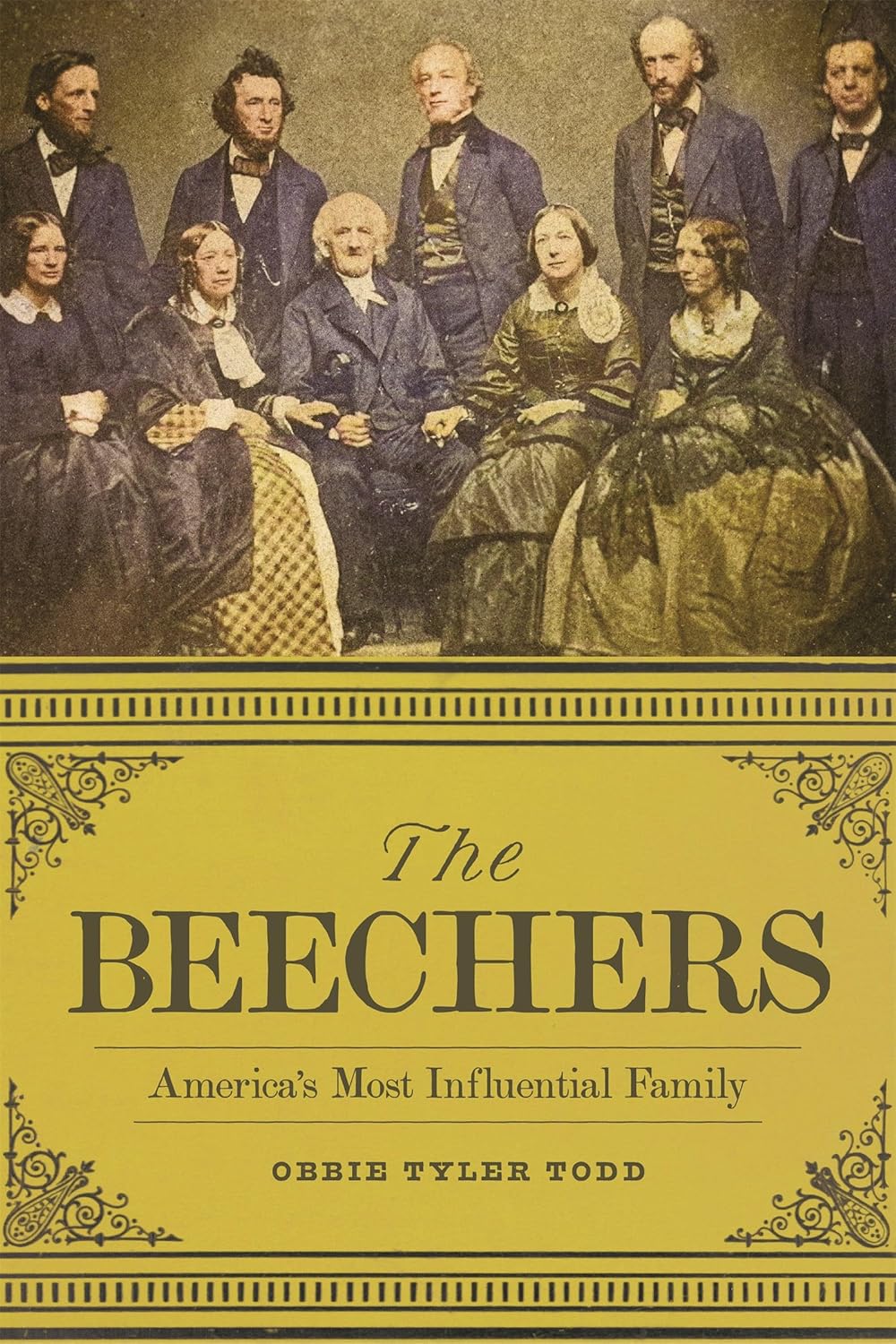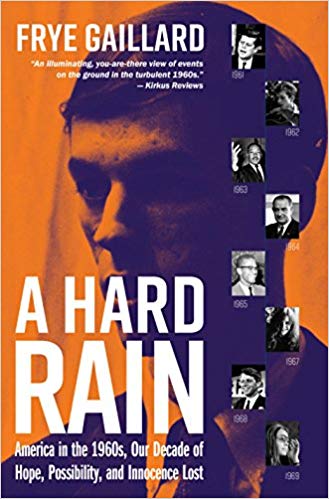The Beechers: America’s Most Influential Family
- By Obbie Tyler Todd
- LSU Press
- 368 pp.
- Reviewed by Charles Caramello
- April 9, 2025
An intriguing account of a cultural-juggernaut clan.

An ideal group biography tells the life stories of multiple individuals and, concurrently, the story of the group those individuals constitute, animating the whole as a single, vital, and organic entity. Since such a biography, in addition, must demonstrate that both the individuals and the group warrant our attention, it often seeks to show — if circumstances permit — how their stories both shaped and were shaped by contending cultural forces during a roiled historical moment.
Obbie Tyler Todd’s absorbing portrait, The Beechers: America’s Most Influential Family, “a true chronological biography of the entire Beecher family,” meets the challenge. Titular superlative aside, Todd rightly claims (and ably demonstrates) that the multitudinous Beecher family, individually and jointly, exerted a uniquely profound and pervasive influence on religion, morality, politics, and public life in the United States from the 1820s through the 1870s.
Family patriarch — and the principal in Todd’s narrative — Lyman Beecher was a New England minister who practiced the “republican brand of Calvinism” known as “New Haven Theology” and who achieved national attention with his temperance tract, Six Sermons on the Nature, Occasion, Signs, Evils, and Remedy of Intemperance (1827). Soon after its publication, Beecher “left his Congregationalist Church in Boston to join the Presbyterian Church in Cincinnati” and set about reforming the “west” as president of Lane Theological Seminary. He also stood trial for heresy during the Old School-New School Presbyterian Schism of 1837.
Beecher’s religious principles, elaborated by Todd in detail, were complex as a theology that reflected subtle doctrinal concepts and sectarian conflicts but simple as a practice that aimed to effect “the spiritual and moral reform of America.” Todd unpacks, on one hand, millennialism and perfectionism — the nature of original sin and free agency — while he unfolds, on the other, “a voluntary religion of the heart aimed at spiritual revival and moral reform.” In both cases, his parsing of Beecher’s beliefs serves his effort to “explore the ‘family business’ of moral influence and explain how Lyman…passed on this American enterprise to his children.”
Those children were legion. Beecher’s first two marriages produced 13 offspring (a third marriage produced none). The 11 siblings who lived to adulthood all flourished in their various professions as theologians and ministers, professors and teachers, revivalists and activists, founders of churches and schools, and authors of learned treatises and celebrated fiction. Each sibling, moreover, typically combined multiple roles, whether complementary or contradictory, and the family dominated the lecture circuit both as moderate conciliators and radical firebrands, particularly in the “Great Debate” over slavery.
Catharine Beecher, the eldest and closest to Lyman intellectually and emotionally, exemplifies the group. A steadfast and trusted family confidant, she founded both the Hartford Female Seminary and the discipline of home economics, achieving “national fame” with her Treatise on Domestic Economy (1841). Consistent with her evangelical principles and belief in “the salvation of America by women,” Catharine adopted the conservative but still emancipatory position that women should achieve economic independence as a path to suffrage. “Like her father,” Todd notes, she was “always reforming, but never revolutionizing.”
Allied with Catharine and closer to his father professionally, Henry Ward Beecher rose to prominence as the nation’s most famous clergyman. Pastor of the Plymouth Church in Brooklyn, “nicknamed ‘Beecher’s Theater,’” Henry was “the New England preacher with the flair of a western revivalist” whom congregants flocked from afar to hear and see. An ardent but ideologically moderate advocate for abolition and women’s rights, he invited Abraham Lincoln to speak at Plymouth Church in 1859 and was selected by the president to raise the American flag at Fort Sumter in 1865. Henry, too, withstood a trial by the Church, accused and acquitted of adultery.
His slightly older sister, Harriet Beecher Stowe, not only was lionized in her time but also, unlike her siblings, remains a household name today. She enjoyed a public career as distinguished as Henry’s, while she also lived, by all accounts, a personal life that was blameless but not untouched by tragedy. In any case, Harriet was fervently anti-slavery and pro-abolitionist and, as is universally acknowledged, contributed immeasurably to the cause with Uncle Tom’s Cabin (1852), prompting Lincoln’s famous if apocryphal homage to “the little woman who made this big war.”
Of course, even the Beecher family had black sheep — in this case, the youngest son and daughter, James and Isabella. A profane and rowdy drunkard expelled from Dartmouth, James too went “west,” first shipping to Asia as a common sailor and next settling in California, where he reformed and, returning to the East, was embraced by the family as its prodigal son. Meanwhile, radical abolitionist and feminist Isabella evidently took the prized family values of independence and activism a bridge too far when she preached the gospel of Victoria Woodhull, preeminent apostle of free love, and was ostracized by the family for this outré act of ministry.
Despite doctrinal and political differences, the Beecher siblings, in historian Mark A. Noll’s nice formulation, “shared a belief that individuals acting freely could change the world, that the family unit was the fundamental driver of human progress, and that American Christian republicanism supplied the best ideology for guiding the human community.” Like their father, moreover, the siblings as a group steered a moderate course through controversy, and so, in Todd’s equally nice aperçu, “had the unique distinction of being behind the most progressive leaders in American reform yet still ahead of the times.”
Their rivals and adversaries dubbed the family’s constellation of beliefs and traits “Beecherism,” using the sobriquet derisively to signify “less of an idea and more of a bravado,” one that combined “theological eccentricity [and] the public swagger and social consciousness that came with it.” Allies at the time and later, however, used the term more favorably to represent “a distinctly progressive and conservative set of values…the Beecher core values of human responsibility and potential, the hope and certainty of the millennium, and the relative compatibility of American and divine governments.”
To make the obvious quip, a nuclear family of the size and force of the Beechers does not expand into an extended family, it explodes into one. The siblings married and had children, and those children had children; as their number multiplied, so did the instances of alcoholism and other troubles. More to the point, the family’s cohesion loosened, its influence dissipated, and its mission lost focus. But thanks to Todd’s skill, The Beechers avoids that fate, braking smoothly before it can lose cohesiveness, momentum, or aim. As a result, it also spares its subjects lingering demises and its readers a prolonged denouement.
Academic historians dream of writing books that will appeal equally to other specialists and to the general public. The Beechers counts among the comparative few that succeed. At once robust and nuanced, packed with copious information and subtle interpretation, it tells a compelling story that is deftly organized and clearly written. One needn’t be a student of Beecherism or of 19th-century American history to appreciate, enjoy, and learn from this exceptional study.
Charles Caramello is a professor emeritus of English at the University of Maryland and John H. Daniels Fellow at the National Sporting Library and Museum in Middleburg, VA.

.png)